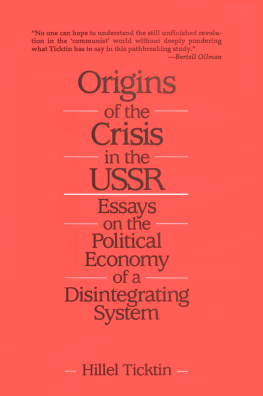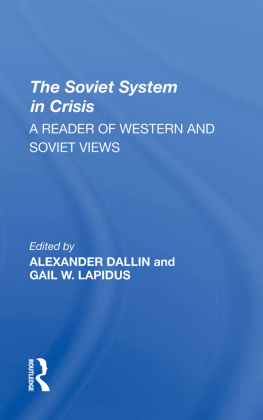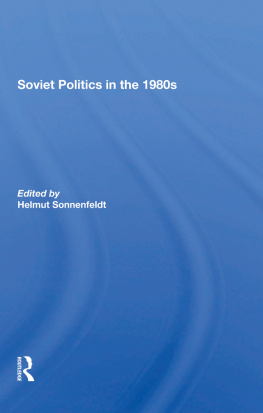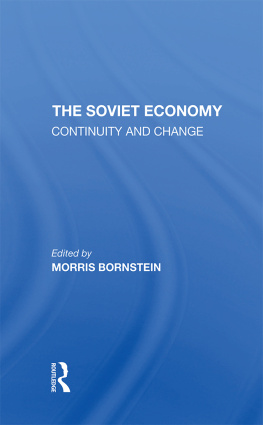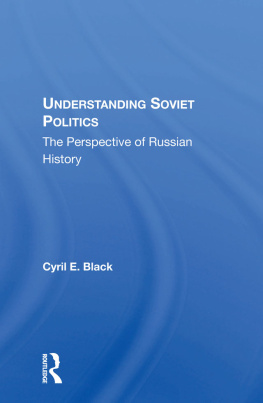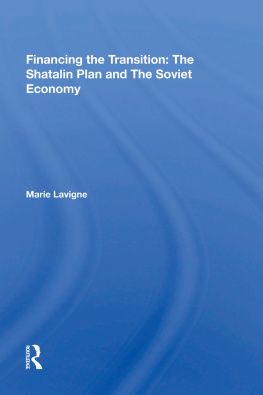Origins of the Crisis in the USSR
Origins of the Crisis in the USSR
Essays on the Political Economy of a Disintegrating System
Hillel Ticktin
First published 1992 by M.E. Sharpe
Published 2015 by Routledge
2 Park Square, Milton Park, Abingdon, Oxon OX14 4RN
711 Third Avenue, New York, NY 10017, USA
Routledge is an imprint of the Taylor & Francis Group, an informa business
Copyright 1992 Taylor & Francis. All rights reserved.
No part of this book may be reprinted or reproduced or utilised in any form or by any electronic, mechanical, or other means, now known or hereafter invented, including photocopying and recording, or in any information storage or retrieval system, without permission in writing from the publishers.
Notices
No responsibility is assumed by the publisher for any injury and/or damage to persons or property as a matter of products liability, negligence or otherwise, or from any use of operation of any methods, products, instructions or ideas contained in the material herein.
Practitioners and researchers must always rely on their own experience and knowledge in evaluating and using any information, methods, compounds, or experiments described herein. In using such information or methods they should be mindful of their own safety and the safety of others, including parties for whom they have a professional responsibility.
Product or corporate names may be trademarks or registered trademarks, and are used only for identification and explanation without intent to infringe.
Library of Congress Cataloging-in-Publication Data
Ticktin, H. (Hillel)
Origins of the crisis in the USSR: essays on the political economy
of a disintegrating system / by Hillel Ticktin.
p. cm.
Includes index.
ISBN 0-87332-861-2 (cloth).
ISBN 0-87332-888-4 (paper).
1. Soviet UnionEconomic conditions1985
2. Soviet UnionEconomic policy1986
3. Perestroika.
I. Title.
HC336.26.T53 1992
338.947dc20
91-4282
CIP
ISBN 13: 9780873328883 (pbk)
ISBN 13: 9780873328616 (hbk)
Dedicated to the memory of my father, who taught me Marxism and the meaning of Stalinism
Contents
This book was long in gestation. By the time many of the fundamental ideas had been presented in lectures and seminars or published in the journal Critique, events had "proved" the thesis: the USSR was disintegrating. I had been working to produce a kind of general theory of the USSR, but the system had now become history. So I have instead discussed the political economy of the USSR in the context of Gorbachev's attempt to restructure the system.
I have refrained from discussing certain important aspects of the political economy of the USSR in depth due to the constraints of space and time. In particular, the national question, the peasantry, and the position of women are all discussed, but not in the form of separate chapters. I have also not discussed other theories of the USSR, except in passing.
This book was made possible in part by a grant that Stephen White and I received for the topic of policy making under Gorbachev. Another kind of debt is owed to the editorial board of Critique and to the many students who criticized and argued with me over the last twenty-five years. Michael Cox, Sandy Smith, Suzi Weissman, Bob Arnot, and Bohdan Krawchenko have all discussed different ideas with me over the years. On a different note, Scott Meikle and David Hillel Ruben taught me the importance of philosophy and of language. To the Soviet citizens who showed me the reality of the USSR, I can only express my gratitude. Finally I have to thank my companion, Lindy Barbour, for her patience (and her insistence on correct grammar).
Origins of the Crisisin the USSR
Introduction: The Aims and Achievements of Gorbachev
We can summarize Gorbachev's perestroika years as a period in which the Soviet elite factionalized; a political alliance was established with the intelligentsia; the economy was given a jolt; the regime, for the first time, admitted the need for democracy; and then an intention to institute a form of market economy was announced. During this same period, the country seemed headed pell-mell toward disintegration. One might say that for a while the process of disintegration was covered over with demands for change. But in reality the disintegration continued, as manifested in the more or less open warfare between elite factions, the exacerbation of social tensions, the escalation of republican demands for autonomy or independence, and an accelerating economic decline.
During the Twelfth Five-Year Plan (19859), both wages and investment rose faster than the planners had intended. Although the economy seemed to pick up in 1988, the plan results showed wages outstripping productivity by a wide margin (for the first time in decades). Until that time, investment in department one (producer goods) exceeded investment in department two (consumer goods), as was the usual pattern. In 1988, consumer goods production grew faster than that of the producer goods sector. The plan results for 1989 continued the reversal in the relative growth rates of consumer goods and producer goods production, but this in part reflected a very low (1.4 percent) growth of industrial production in general, which thereafter dipped to negative growth. The trend for wages to outstrip productivity continued in 1989, and there was a massive increase in money supply; inflation reached increasingly higher levels. The result was shortages. Rationing became general. It was a watershed year.
The constant harping on the extraordinary economic situation in the summer of 1989 raised suspicions that it had been engineered by either pro- or antireform interests. Much was made of the budget deficit, although the USSR has not functioned on the basis of money or the budget since at least 1929. Nonvalue economic plans had been the centerpiece of the economy. That the state used direct emissions of rubles to balance its budget was quite clear, but hardly significant, given the trivial role of the ruble in the economy. The stress on the urgency of economic crisis, coming as it did from sections of the ruling elite, could only be a reflection of their need to effect a rapid change in economic policy.
Meanwhile, the demands of workers for a higher standard of living and control over their own lives were in no way being met. The more concessions were made to the intelligentsia in terms of material benefits and freedom of speech, the more blatant was the declining position of workers. In this light, the most important event of the period was the miners' strike of July 1989. The miners' economic demands were not difficult to concede, at least in verbal terms. Consumer goods could be imported, but that was only a one-time solution. Genuine workers' committees were another matter. So too was the miners' demand, echoed by the trade unions, that private enterprise be limited. The underlying egalitarian ethos of the workers opposed the whole of Gorbachev's economic platform in all its many guises. These demands struck at the heart of the system and could not be conceded.
While the handling of the miners' strike showed that the regime remained master of the situation, nonetheless the workers had given warning that elements of the reform program were unacceptable. Higher prices, cooperatives (often a euphemism for the private provisioning of the well-off), unemployment, and attacks on labor were barred unless the regime wanted a strike wave on its hands.

